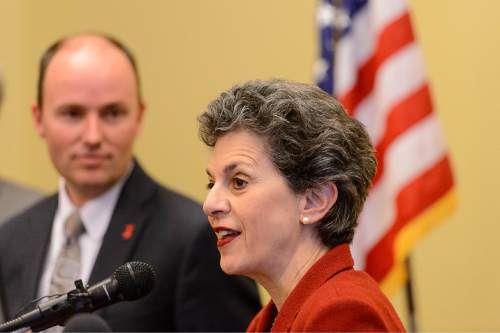This is an archived article that was published on sltrib.com in 2016, and information in the article may be outdated. It is provided only for personal research purposes and may not be reprinted.
A Democratic lawmaker says voters might be able to end the yearslong legislative fight over expanding Medicaid, which would provide health care coverage to more poor Utahns.
Rep. Patrice Arent, D-Millcreek, introduced HB275 to create a process to put nonbinding questions on the ballot, and she plans a separate resolution to allow questioning voters this year about Medicaid expansion. It seeks opinions only and would not actually pass legislation.
"Because the Legislature has not passed any form of Medicaid expansion — or may just pass a very frail version — I feel the public should weigh in on this issue," Arent said Wednesday.
"We have seen plenty of public polling that shows the public supports having some sort of significant Medicaid expansion," she said. "This is another process that will have more weight because people are actually voting" — one that could prod members to act while giving political cover to some who have wavered.
A recent Salt Lake Tribune/Hinckley Institute of Politics poll showed a plurality of Utah voters — 44 percent — supported Medicaid expansion at a state cost of $78 million, while about 39 percent opposed such a move.
Republican leaders don't think much of Arent's plan, and they say it could make it more difficult to pass any sort of Medicaid expansion this year.
If her bill passes, "I expect there will be quite a number [of House members who] will say, 'We don't have to do anything this session. Let's wait to see what the people say about it,' " said House Majority Leader Jim Dunnigan, R-Taylorsville. "That postpones for another year providing any health-care coverage to those in extreme poverty."
He added some members already want to wait until after the presidential election to see what the possibilities are to repeal the Affordable Care Act, also known as "Obamacare."
The ACA had intended that states would expand Medicaid to cover some of the poor who don't qualify for subsidies in the health marketplace, and it offered money temporarily to help.
Utah lawmakers have so far rejected the offer, worrying they could not afford it in the long term, and have been unable to agree on any plan to allow coverage for some of the poorest people who are uninsured.
Senate President Wayne Niederhauser, R-Sandy, said the Legislature already knows the public supports Medicaid expansion without a ballot measure.
"There's been enough polling out there," Niederhauser said. "It's a nice idea, but I don't think it gets us any more information we don't already have."
Senate Budget Chairman Lyle Hillyard, R-Logan, said a simple measurement of support doesn't go far enough.
"It doesn't ask the second question: How are you going to pay for it? And what do you do when it explodes like it has in other states?" Hillyard asked.
If people support it, he said, they should have to choose what taxes they want to raise to pay for it.
Dunnigan said actuaries believe that 43,000 Utahns are in the "coverage gap," which includes people who don't qualify for Medicaid because they don't have children, are not pregnant, disabled or seniors, or who have children but earn from 49 percent to 100 percent of the federal poverty level. They also do not qualify for insurance subsidies.
Dunnigan said he is preparing another expansion proposal, which is being drafted.
"It will address one-third of the uninsured population in the coverage gap," he said.
Gov. Gary Herbert proposed a more generous plan last year, called "Healthy Utah," which passed the Senate but was blocked in the House.
Dunnigan said many, but not all, of the people his bill would cover are homeless. "They need medical care. They need treatment for mental-health issues [and] substance abuse. And there are others that just have some severe health issues. It will be based on income. It will capture and help those in the lowest income, and hopefully get them stabilized."
But,if Arent's proposal moves forward, "We'll end up getting nothing this session," Dunnigan warned. "People will wait another year to get coverage."
Arent disagrees and said her proposal could spur action. The fight over Medicaid expansion "has gone on for years and years and years, and it is now time for the public to express its views through this process."
She said asking nonbinding questions on ballots could be useful in a few other areas where lawmakers may be less likely than the public to seek action, such as raising taxes for education. But "I don't anticipate this process will be used frequently."
Robert Gehrke contributed to this report.



